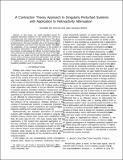A Contraction Theory Approach to Singularly Perturbed Systems with Application to Retroactivity Attenuation
Author(s)
Del Vecchio, Domitilla; Slotine, Jean-Jacques E.
DownloadDel Vecchio_A contraction.pdf (120.5Kb)
OPEN_ACCESS_POLICY
Open Access Policy
Creative Commons Attribution-Noncommercial-Share Alike
Terms of use
Metadata
Show full item recordAbstract
In this paper, we revisit standard results for singularly perturbed systems on the infinite time interval by employing tools from nonlinear contraction theory. This allows us to determine explicit bounds both on the rate of convergence of trajectories to the slow manifold, and on the distance between these trajectories and those of the reduced system. We illustrate the application of the proposed technique to the problem of retroactivity attenuation in biomolecular systems, that is, to the problem of attenuating the effects of output loading due to interconnection to downstream systems. By virtue of the explicit bounds, we can single out the key biochemical parameters to tune in order to enhance retroactivity attenuation. This provides design guidelines for synthetic biology devices that are robust to loading and can function as insulation devices just like insulating amplifiers work in electronics.
Date issued
2011-12Department
Massachusetts Institute of Technology. Department of Mechanical EngineeringJournal
Proceedings of the 50th IEEE Conference on Decision and Control and European Control Conference (CDC-ECC), 2011
Publisher
Institute of Electrical and Electronics Engineers (IEEE)
Citation
Del Vecchio, Domitilla, and Jean-Jacques Slotine. “A Contraction Theory Approach to Singularly Perturbed Systems with Application to Retroactivity Attenuation.” IEEE, 2011. 5831–5836.
Version: Author's final manuscript
ISBN
978-1-61284-799-3
978-1-61284-800-6
ISSN
0743-1546